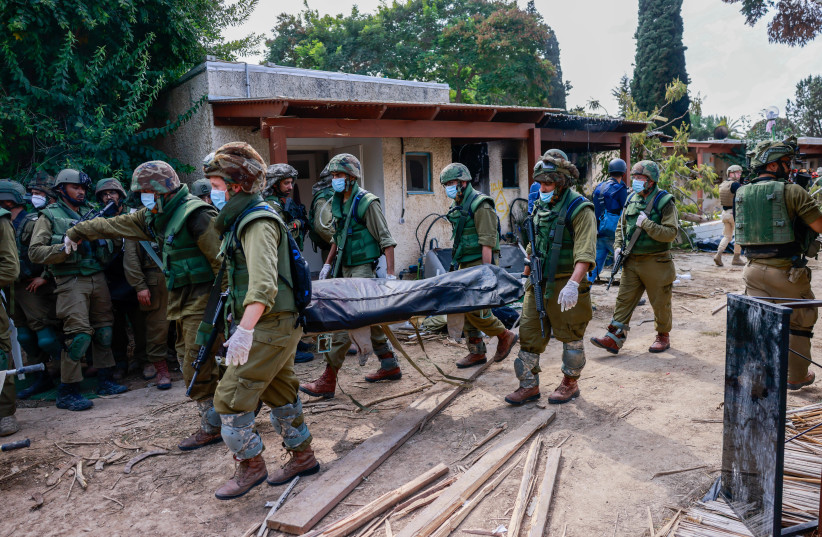While the Kingdom of Jordan has no official relations with the Islamic Hamas movement, it has plenty to say about Hamas's Oct. 7 attack on Israel.
For more stories from The Media Line go to themedialine.org
Jordan was a little late to respond, releasing its first statement at 3 pm local time, hours after the start of the Hamas operation. As with most issues, Jordan did not take a strong position, instead making what it considers a “balanced statement” and leaving room for different points of view.
The country’s Ministry of Foreign Affairs stressed the need to stop the escalation in Gaza and its surroundings. It warned of the dangerous repercussions of this escalation, especially given that violations of the rights of Arab Israelis and Palestinians in the West Bank tend to flare up in response to terrorist acts against Jewish Israelis.
The statement also condemned Israel's treatment of the Palestinian people and emphasized Jordan's role in protecting the Islamic and Christian holy sites in Jerusalem.
Jordan’s official position does not line up with the general feelings of Jordanians. A protest was held in front of Al-Kalouti Mosque in the Rabiah neighborhood of Amman, hundreds of yards away from the Israeli Embassy.
The participants chanted in support of the military operation launched by Hamas against Israel, using slogans like “We die, and long live Palestine,” “A nation led by Muhammad will not kneel,” and “One people, not two peoples,” referring to Palestinians and Jordanians. The protesters demanded the expulsion of the Israeli ambassador and the closure of the Israeli Embassy.
Jordanian security was most worried about the repeated calls to join the resistance in Palestine. In response to the calls, security forces erected checkpoints on the way from Amman to the Jordan Valley and attempted to stop many who were heading towards Karameh to gather in front of the Monument of the Unknown Soldier in an expression of support for the resistance in Gaza.

Jordan's wait-and-see approach
Abdul Qader Al-Khatib, deputy chair of the Freedoms Committee of the Islamic Action Front party, said in a public statement that about 20 people participating in the event to support Gaza were arrested by security services and later released.
On Sunday, the Jordan Bar Association stopped all legal action at the courts for an hour in solidarity with the Palestinian people. In an event at the Palace of Justice, the association also called to open a fund to support the Palestinian people, in full solidarity with Hamas's “Operation Al-Aqsa Flood.”
In interviews with The Media Line, most analysts in Jordan praised the operation in Gaza but did not believe it would cause any major shift in the regional context.
Writer and political analyst Hamada Faraneh described the Gaza operation as “qualitative and advanced” in terms of its achievements, as it was able to surprise and confuse the Israel Defense Forces and frustrate Israel’s military, security, and political institutions.
Faraneh pointed out that the operation was carried out using a combination of land, air, and sea attacks, a first for the Palestinians. He said that one should not expect a qualitative shift in the regional situation soon. “The situation will remain the same, and we expect the balance of deterrence between the Gaza Strip and Israel to continue,” he told The Media Line.
He said that the countries that decided to normalize relations with Israel will not back down from their decision but may choose silence and that the countries currently seeking normalization may postpone their steps for a period ranging from weeks to months. The general trend will be according to what the regional parties desire, Faraneh said.
Political analyst Oraib Rantawi, director of the Amman-based Al-Quds Center for Studies, pointed out that Jordan does not have good relations with Hamas, which limits the country’s ability to influence the movement. The “matter is due to Egypt’s role as a geographical neighbor of the Gaza Strip, as well as the role of Qatar and Turkey to a lesser extent,” he told The Media Line.
Rantawi explained that Israeli-Jordanian relations “are deteriorating due to the extremist Israeli government, which reduces Jordan’s ability to exert influence on the conflicting parties.” He said that Israel feels that its image has been severely damaged by the recent battle, which is considered one of the worst military confrontations ever for Israel. Even Israel’s allies could not hide their shock and disappointment at the Israeli performance.
Ayman Hunaiti, a Jordanian expert in Israeli affairs, told The Media Line that the Israeli media dealt transparently with the events and admitted failure in the intelligence and security aspects. Many articles have been published in the Israeli press blaming Prime Minister Benjamin Netanyahu’s government for the Israeli response to the attack.
Hunaiti said that Hamas's operation is unprecedented and could have major future repercussions while noting that political gains require time. He emphasized that what is happening is considered a war, which indicates a strategic decision on the part of Israel to eliminate and destroy Hamas's military power, given the professionalism seen in the Hamas operation.
Overall, Jordan is largely taking a wait-and-see approach, given that success in any intervention into the situation seems very remote. This is due in large part to the Jordanian government having done little to build up strong relations with Hamas.
Some analysts predict that the events will end up benefiting Palestinian Authority President Mahmoud Abbas, who, among the Palestinians, is seen as the only adult in the room. He will no doubt be called in to help move the dormant peace process and to muzzle Hamas, the latter of which he will likely refuse to do as he has already rejected strong EU and US pressure to denounce the attack on Israel.
